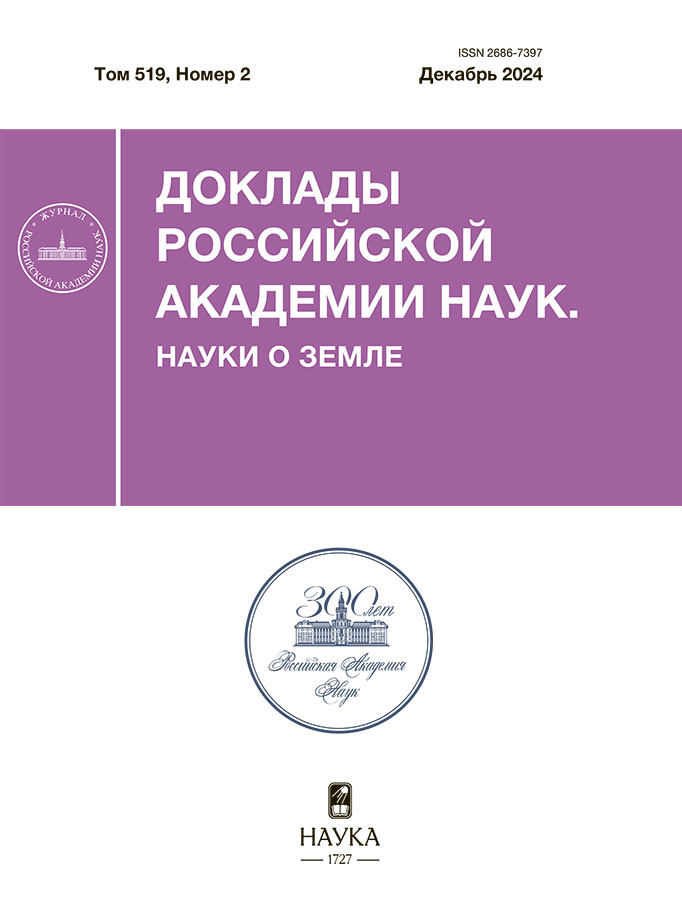Stability of carbonates during subduction: the role of dissolution in dehydration fluids
- Authors: Kruk A.N.1, Sokol A.G.1, Khokhryakov A.F.1, Palyanov Y.N.1
-
Affiliations:
- V.S. Sobolev Institute of Geology and Mineralogy Siberian Branch of the Russian Academy of Sciences
- Issue: Vol 519, No 2 (2024)
- Pages: 76-82
- Section: MINERALOGY
- Submitted: 04.06.2025
- Published: 28.12.2024
- URL: https://rjmseer.com/2686-7397/article/view/682452
- DOI: https://doi.org/10.31857/S2686739724120103
- ID: 682452
Cite item
Abstract
The dissolution of carbonates in dehydration fluids during subduction can significantly affect the efficiency of carbonate transport to the mantle and, in general, influence the deep carbon cycle. This study provides experimental data on the solubility of aragonite in aqueous fluids with varying NaCl content, measured at pressures and temperatures typical of an average subduction geotherm. At 3.0 GPa and 750°C, the solubility of aragonite in aqueous fluids is found to be 2.4±0.2 wt. %, which is consistent with previous estimates. It is demonstrated for the first time that at 5.5 GPa and 850°C, the solubility of aragonite increases significantly, reaching 12.1±0.6 wt. %. Moreover, increasing the NaCl concentration in the aqueous fluid up to 9 wt. % does not affect the solubility of aragonite within the measurement error. Therefore, aqueous fluids formed at pressures above 5.5 GPa during the dehydration of serpentinized oceanic lithosphere can facilitate the dissolution and removal of a substantial amount of subducted carbonates into the surrounding mantle.
Keywords
Full Text
About the authors
A. N. Kruk
V.S. Sobolev Institute of Geology and Mineralogy Siberian Branch of the Russian Academy of Sciences
Author for correspondence.
Email: KrukAN@igm.nsc.ru
Russian Federation, Novosibirsk
A. G. Sokol
V.S. Sobolev Institute of Geology and Mineralogy Siberian Branch of the Russian Academy of Sciences
Email: KrukAN@igm.nsc.ru
Russian Federation, Novosibirsk
A. F. Khokhryakov
V.S. Sobolev Institute of Geology and Mineralogy Siberian Branch of the Russian Academy of Sciences
Email: KrukAN@igm.nsc.ru
Russian Federation, Novosibirsk
Yu. N. Palyanov
V.S. Sobolev Institute of Geology and Mineralogy Siberian Branch of the Russian Academy of Sciences
Email: KrukAN@igm.nsc.ru
Corresponding Member of the RAS
Russian Federation, NovosibirskReferences
- Plank T., Manning C. E. Subducting carbon // Nature. 2019. V. 574. P. 343–352. https://doi.org/10.1038/s41586-019-1643-z
- Kelemen P. B., Manning C. E. Reevaluating carbon fluxes in subduction zones, what goes down, mostly comes up // Proceedings of the National Academy of Sciences. 2015. V. 112. P. E3997–E4006. https://doi.org/10.1073/pnas.1507889112
- Lan L., Kolesnikov A., Kozai Y., Iizuka R., Sunagawa I. and carbonate mobility in subduction zones: An experimental study on carbonate solubility in aqueous fluids under deep subduction conditions // Geochimica et Cosmochimica Acta. 2023. V. 318. P. 96–114. https://doi.org/10.1016/j.gca.2021.01.002
- Frezzotti M. L., Selverstone J., Sharp Z. D., Compagnoni R. Carbonate dissolution during subduction revealed by diamond-bearing rocks from the Alps // Nature Geoscience. 2011. V. 4. P. 703–706. https://doi.org/10.1038/ngeo1246
- Newton R. C., Manning C. E. Experimental determination of calcite solubility in H2O-NaCl solutions at deep crust/ upper mantle pressures and temperatures: Implications for metasomatic processes in shear zones // American Mineralogist. 2002. V. 87(10). P. 1401–1409. https://doi.org/10.2138/am-2002-1016
- Caciagli N. C., Manning C. E. The solubility of calcite in water at 6–16 kbar and 500–800°C // Contributions to Mineralogy and Petrology. 2003. V. 146. P. 275–285. https://doi.org/10.1007/s00410-003-0500-3
- Facq S., Daniel I., Montagnac G., Cardon H., Sverjensky D. A. In situ Raman study and thermodynamic model of aqueous carbonate speciation in equilibrium with aragonite under subduction zone conditions // Geochimica et Cosmochimica Acta. 2014. V. 132. P. 375–390. https://doi.org/10.1016/j.gca.2014.02.017
- Alt J. C., Teagle D. A.H. The uptake of carbon during alteration of ocean crust // Geochimica et Cosmochimica Acta. 1999. V. 63. P. 1527–1535. https://doi.org/10.1016/S0016-7037(99)00123-4
- Plank T. The chemical composition of subducting sediments / In: Holland HD, Turekian KK (Eds.). Treatise on geochemistry. Elsevier, Amsterdam. 2014. P. 607–629. https://doi.org/10.1016/B978-0-08-095975-7.00319-3
- Hermann J., Spandler C., Hack A., Korsakov A. Aqueous fluids and hydrous melts in high-pressure and ultra-high pressure rocks: Implications for element transfer in subduction zones // Lithos. 2013. V. 156–159. P. 1–17. https://doi.org/10.1016/j.lithos.2012.08.008
- Sverjensky D. A., Huang F., Xie X. Beyond organics in the deep Earth: The role of oxygenated organic compounds in carbon cycling // Geochemical Perspectives. 2014. V. 3. P. 127–151. https://doi.org/10.7185/geochempersp.3.2
- Huang F., Sverjensky D. A. Extended Deep Earth Water model for predicting major element mantle metasomatism // Geochimica et Cosmochimica Acta. 2019. V. 254. P. 192–230. https://doi.org/10.1016/j.gca.2019.03.019
- Palyanov Y. N., Kupriyanov I. N., Khokhryakov A. F., Borzdov Y. M. High-pressure crystallization and properties of diamond from magnesium-based catalysts // CrystEngComm. 2017. V. 19. № 31. P. 4459–4475. https://doi.org/10.1039/C7CE01083D
- Sokol A. G., Khokhryakov A. F., Palyanov Y. N. Composition of primary kimberlite magma: constraints from melting and diamond dissolution experiments // Contributions to Mineralogy and Petrology. 2015. V. 170. P. 1–18. https://doi.org/10.1007/s00410-015-1182-z
- Manning C. E., Frezzotti M. L. Subduction-zone fluids // Elements: An International Magazine of Mineralogy, Geochemistry, and Petrology. 2020. V. 16(6). P. 395–400. https://doi.org/10.2138/gselements.16.6.395
- Scambelluri M., Fiebig J., Malaspina N., Muntener O., Pettke T. Serpentinite subduction: Implications for fluid processes and trace-element recycling // Int. Geol. Rev. 2004. V. 46. P. 595–613. https://doi.org/10.2747/0020-6814.46.7.595
- Schmidt M., Poli S. Devolatilization during subduction // Treatise on geochemistry: V. 4: the crust. Elsevier, 2013. V. 4. P. 669–701. https://doi.org/10.1016/B978-0-08-095975-7.00321-1
- Ulmer P., Trommsdorff V. Serpentine stability to mantle depths and subduction-related magmatism // Science. 1995. V. 268. P. 858–861. https://doi.org/10.1126/science.268.5212.858
- Сокол А. Г., Крук А. Н., Козьменко О. А., Пальянов Ю. Н. Стабильность карбонатов при субдукции: влияние режима дефлюидизации хлорсодержащего пелита // Доклады Российской Академии наук. Науки о Земле. 2023. Т. 509. № 1. С. 50–55. https://doi.org/10.31857/S2686739722602381
- Sokol A. G., Kozmenko O. A., Kruk A. N. Composition of supercritical fluid in carbonate-and chlorine-bearing pelite at conditions of subduction zones // Contributions to Mineralogy and Petrology. 2023. V. 178(12). P. 90. https://doi.org/10.1007/s00410-023-02074-0
Supplementary files














